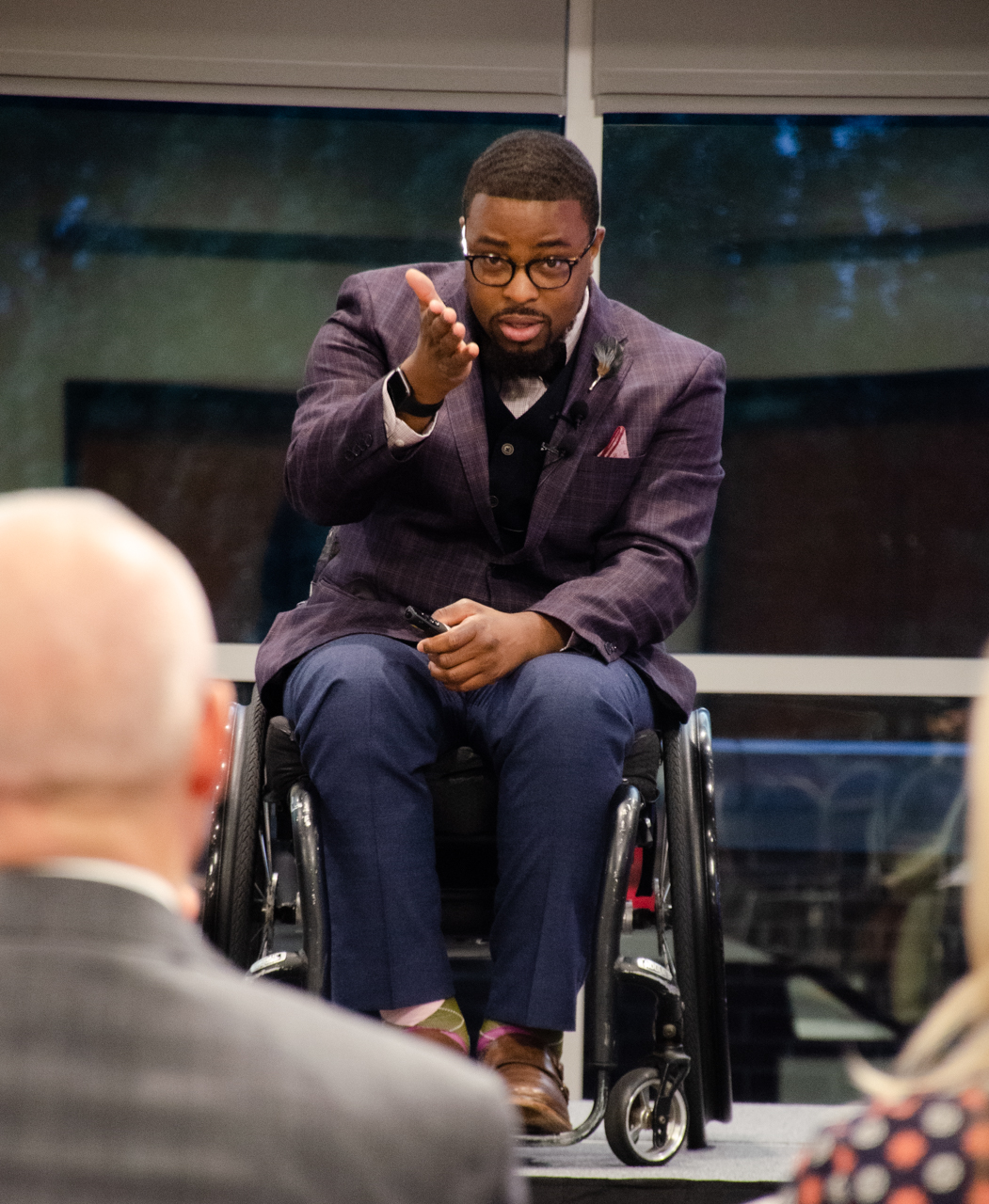
Dr. Feranmi Okanlami was the captain of the track team at Stanford University. An athlete and a scholar, Okanlami received a medical degree from the University of Michigan and went on to do his orthopedic surgery residency at Yale University. During his third year at Yale, he jumped into a pool during a fourth of July party. The pool wasn’t deep, and Okanlami broke his neck, leaving him paralyzed from the waist down.
Okanlami is now an assistant professor at the University of Michigan Medical Center and Director of Medical Student Programs Office for Health, Equity and Inclusivity. As part of the University of Mississippi’s Dialogues on Diversity, Okanlami hosted “Disabusing Disability,” his traveling dialogue series that challenges how society and academic institutions view and treat people with disabilities.
As a practicing physician who uses a standing wheelchair to perform surgery, Okanlami recounted the long recovery process that has led him to this point.
“When asked if there’s anything I’d change, I can’t say that I would,” Okanlami said.
Okanlami challenged the audience to a conversation, as opposed to lecturing for the entire event. He first called on Provost Noel Wilkin, one of several that he asked the same question: “Why are you here?”
“I’m here to learn and gain perspectives of what people with different levels of disabilities’ lives are like,” Wilkin said.
Okanlami presented several pictures in the student union ballroom to challenge the audience’s perspectives. One showed three people at a baseball game, each a different height, with three boxes for them to stand on. He used this to create an audience conversation on equality, equity and reality.
“Such a seemingly easy question becomes so complex,” he said. “I don’t like to launch straight into disability because I think it’s important to give context.”
Okanlami said that while the University of Michigan Medical Center strives to be proactive in being inclusive among students and faculty with disabilities, many medical institutions are lacking.
“Medical thinks that if you have anything wrong with yourself, you can’t practice medicine,” he said. “That makes no sense.”
He argued that because of the way in which diversity talks are often geared, the people who need to hear the message are often uninvolved in the conversation.
“Too often diversity talks are geared toward the minority,” Okanlami said. “They make the majority feel as though they are out of place, and even push them away.”
Okanlami described his own battles with people’s perception of him before and after his disability, and how people with disabilities are often made to feel left out, especially those with what he called “invisible disabilities,” like depression.
“When I talk, people see my wheelchair,” he said. “They are more comfortable seeing physical disabilities. We need to do a better job with invisible disabilities. When you’re not given access to something, other people are saying they don’t value your participation.”
Okanlami condemned people’s tendency to generalize individuals with disabilities. He said that when confronting these issues, effort is paramount.
“If you’ve met one person in a wheelchair,” he said, “you’ve met one person in a wheelchair. We’re still going to mess up and make mistakes, but with an egoless-ness and if people see that you’re trying, they’re going to appreciate that.”
A former collegiate athlete, Okanlami has created an Adaptive Sports Program at Michigan that allows those with disabilities to remain physically active.
“Whether you’re a paralympic athlete or just someone who wants to go to the rec center, everyone should have access to exercise,” he said.
Okanlami challenged Ole Miss by talking about the University of Alabama opening the Stran-Hardin Arena in 2018, a $10 million venue solely for adapted sports, such as wheelchair basketball. It is the first of its kind among college sports programs. He used this as a call for action among other universities to devote more resources for disabled students.
“If this were something seen as a priority throughout the institution, there wouldn’t be a need for a group on campus that advocates for disabilities,” Okanlami said. “Every group would be doing it. Just because you put a ramp up to the building, (it) doesn’t mean those who use stairs can’t use the ramp, too.”















